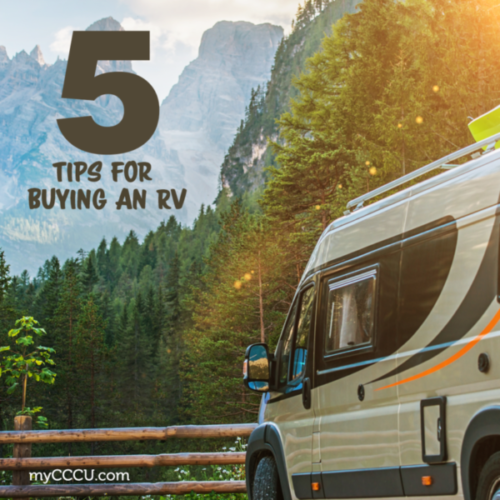The COVID-19 pandemic has changed many people’s vacation plans. Flying overseas may no longer be an option. Cruises are canceled. So how can you enjoy your time off and get away from home for a while? Buying a recreational vehicle (RV) could be the answer. With an RV, you don’t have to worry about booking hotel rooms or using public bathrooms on the road. RVs let you and your family travel safely with all the comforts of home.
Buying an RV is a little more complicated than buying a car, so it’s important to do some research first. What type of vehicle do you need? What will you use it for? How many people will need to sleep in it? What comforts do you expect it to have? Your answers to these questions can help you decide where to concentrate your search. Here are some tips you’ll need to get the best vehicle for you and your family’s needs.
- Know the different types of RVs.
What do you think of when you think of an RV? Do you envision the huge, self-contained “tour bus” type of RV? These are called Class A motorhomes, and they offer the most space and amenities—but they’re also the most expensive. Think of them as a hotel room on wheels. One thing to keep in mind about Class A motorhomes is that you may also want to tow a smaller car to use when exploring your surroundings.The Class B motorhome, or “camper van,” is based on a van so it tends to be much smaller than the Class A. Because of their smaller size, they don’t have quite as many amenities as Class A models. However, they are easier to park and handle on the road, so you probably won’t need to bring along a smaller car.The Class C motorhome is built on a large truck body, similar to a U-Haul truck. They offer similar amenities to a Class A motorhome but are less challenging to drive and tend to get better gas mileage. Class C motorhomes can be a good, budget-friendly compromise between the larger living area of the Class A and the drivability of the Class B. Other RVs are trailers that can be towed behind a truck or SUV. The two most common types are travel trailers and fifth-wheel trailers. Travel trailers are usually smaller, without some of the fancier amenities of the self-contained RVs. Fifth-wheel trailers are larger and can be almost as luxurious as the motorhome models, with plenty of room for furnishings. They can be quite tall, however, which can cause some problems with low bridges.
- Know your state’s licensing requirements.
Depending on the state you live in, you may need a commercial driver’s license to operate an RV (or a combination of vehicles, if you’re also towing a smaller car or trailer) that weighs over 26,000 pounds. Be sure to contact your DMV to find out your state’s requirements before you buy.
- Decide how much RV you need.
Before you’re dazzled by the dealership’s display, think about how much RV you’ll need for yourself and your family. For a luxurious getaway, a Class A motorhome sounds like a great choice. But, for example, if you have very small children who need to ride in car seats, a Class B or travel trailer may be a better choice. And, of course, you’ll want to know exactly how much the RV you want weighs, as well as its height. - Make sure your vehicle can handle the RV’s weight.
If you’re buying a towable trailer rather than a self-contained motorhome, you’ll need a vehicle that can handle its weight. While SUVs are usually enough to haul around a small travel trailer, you may need a heavy-duty pickup truck to take a fifth-wheel on the road. Check your truck or SUV owner’s manual to find out how much weight it can handle. And remember, you’ll need to allow for the weight of passengers, as well as water for the trailer’s bathroom and kitchen tanks. - Have the RV of your choice inspected before you buy.
Any reputable dealer should understand that you want to make sure you’re getting a good quality vehicle. So, don’t be shy about having the RV you want inspected. It’s best to hire your own specialist to inspect the RV rather than use the dealer’s. That way, you can be sure the inspector has your best interests in mind. Services like Lemon Squad can help you check for damage in places you might not have considered, like the cabinets and appliances.
Lastly, although this isn’t a tip for buying RVs, it’s a good tip for enjoying them to the fullest in these challenging times. Due to the pandemic, some campgrounds and attractions may be closed. Also, some campgrounds may have temporarily changed or closed the features they have available, such as laundry facilities or convenience stores. Be sure to call ahead or check the location’s website before you travel.
Whatever recreational vehicle you choose, we’re here to help with RV loans that can get you started on your road trip today. Our loans can give you the freedom to roam while you enjoy all the comforts of home!
Photo by duallogic on Envato Elements
This article should not be considered legal, tax, or financial advice. You may wish to consult a tax or financial advisor about your individual financial situation.





